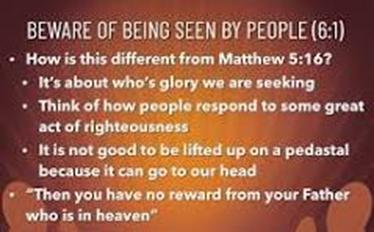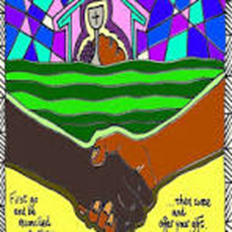
Matthew 7:1-6 Do Not Judge (Luke 6:37-42; Romans 14:1-12)
“Do not judge, or you will be judged. For with the same judgment you pronounce, you will be judged; and with the measure you use, it will be measured to you. Why do you look at the speck in your brother’s eye, but fail to notice the beam in your own eye? How can you say to your brother, ‘Let me take the speck out of your eye,’ while there is still a beam in your own eye? You hypocrite! First take the beam out of your own eye, and then you will see clearly to remove the speck from your brother’s eye.
It was the talk of Capernaum! A local carpenter was carrying a large beam of wood down the street to a construction site when one of the bright young men of the town rushed out of his house and into the street without paying attention. Before realizing it, this fellow literally ran into his neighbor the carpenter, or rather into the beam. Beam met eye, and the young man wound up wearing an eye patch for the next two months. The accident victim would have garnered far more sympathy had it not been for the fact that he was a Pharisee noted for having a very high opinion of himself while freely criticizing others for the slightest infractions of minute religious legalities.
When Jesus came to town, someone told him this story and he employed it in his teaching. Jesus is not saying that we cannot help correct someone else, but he wants us to make sure that we don’t have anything in our lives with which we should deal first. Many times, we want to minimize our shortcomings while maximizing those of others; Jesus says that to behave that way is as bad as someone with a huge piece of wood in his/her eye criticizing someone else for having a speck of wood in their eye.
It’s really easy to judge others and we do it many times a day without even thinking about it. Someone does something foolish and we call him/her an idiot. If someone cuts us off in traffic, we may curse them, little realizing that they might be in a desperate run to the hospital. When I was in surgery residency, an acquaintance at a Bible study sadly misjudged me, assuming that since I was a doctor, I must have an enormous salary. (Wrong! Doctors in training didn’t make big bucks then!) At the time, I was supporting two children through World Vision and paying travel expenses to interview for pediatric surgery residency. Most of the time, I rode my bicycle to the hospital rather than driving my car. I had so little money that when pranksters lifted the rear end of my small car into the street and the police were ready to tow it, my boss had to appeal to the mayor of Charleston, SC, that I was an innocent victim. Although the towing charge was minimal, I lacked even that much money. My Bible study acquaintance attempted to smear me, claiming that I was a cheat who manipulated people for money; fortunately, others refused to agree.

“Do not give dogs what is holy; do not throw your pearls before swine. If you do, they may trample them under their feet, and then turn and tear you to pieces.” Here Jesus is mentioning dogs and swine, two animals that are both considered unclean by the Jews at this time. Mosaic Law forbids Jews from eating pork, so pigs have been considered unclean for centuries. The Jews are fighting a cultural battle against a rising tide of Greek and Roman influence to the point that some young Jewish men are undergoing reversal of their circumcisions so that when they exercise in the nude in the gymnasiums, they will look like Greeks and Romans. Observant Jews may refer to Gentiles as pigs or dogs because they refuse to worship Yaweh but worship pagan deities instead and have lax morals. Greeks and Romans think nothing of eating pork and if a Roman really wants to insult the local Jews, he might bring a pig into the synagogue.
Most Jews will consider teaching Gentiles-or anyone else who is hard-hearted-anything holy because they will not understand or appreciate it. To attempt to teach Torah to someone who does not appreciate it is just as useless as throwing pearls before pigs. Pigs will trample precious things under foot and then attack the one who has made this attempt. Hard-hearted listeners will be as unreceptive as the pigs and may verbally or even physically attack.
While most of Jesus’ listeners will not eat pork themselves, they still are familiar with the behavior of pigs. Even domesticated pigs may behave viciously at any moment, particularly mother pigs with litters of baby pigs. (True story-my family raised pigs. I once watched as my grandfather was trying to maneuver a mother pig with babies into a farrowing crate. Suddenly the mother pig went “Whoof!” and shredded my grandfather’s pant leg into ribbons. Grandpa quickly jumped over the lower half of the barn door, leaving the sow in possession of the whole room. Blessedly, Grandpa’s leg was fine; however, I gained a new appreciation for just how vicious pigs could be.)
There is nothing wrong with being kind to people or attempting to share the Gospel with them. But sometimes we must use discernment in our approach. When we realize that our audience is not receptive, it may be time to withdraw and regroup. Many people are won more by acts of kindness than by teaching; however, sometimes we can even be taken advantage of in our attempts to be kind. May God give us grace and discernment to know when to speak and when to withdraw.
PRAYER: Father God, thank You for loving us and for caring for us. Lord, help us to leave judgement to You. Help us also to have discernment in sharing Your truth. In the mighty and precious Name of King Jesus. Amen.












